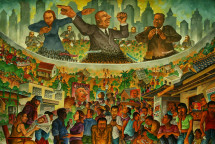Reterritorializing the food sovereignty model in Ecuador: the role of the Agroecological Collective in a context of disputed territories
Temas
Regiones
To what extent is the Agroecological Collective of Ecuador scaling and locating agroecology in a counter-hegemonic process in Ecuador?

Autores
Politics, space, production of political subjects and the role of agroecology as generator of bio-emancipation, constitute critical strategies in the counter-hegemonic process, as has been seen in the Movimiento Sin Tierra (MST) in Brazil. The Agroecological Collective of Ecuador (CAE) puts into practice these strategies, constituting itself as a collective political subject that generates resistance and agroecology reterritorialisation, “occupying the social and political arena in dispute, using counter-hegemonic proposals, with food sovereignty as a political flag (and) as a civilisational proposal of sustainability.
However, in the framework of an agroecological transition, its role is marginal. The lack of networking with other indigenous/peasant organizations and movements not (directly) linked with the agrifood system could became the main weakness of the CAE in relation to scaling agroecology. This fault doesn’t fall solely on the shoulders of the CAE, as the lack of networking occurs also among the indigenous/peasant organizations in Ecuador, which not only does not coordinate, but is manifest in rivalries and distancing relations for political reasons. This could become one of the main factors that affect the formation of a contrahegemonic process that could allow the agroecological transition unfeasible.
A counterhegemonic process should go through a wider process of networking of heterogeneous collectives/movements/actors ideologically linked, that through their political action could constitute a popular mass. This could lead the way not only towards the agroecological transition, but towards an ecosocial transformation of the productive and consumerist matrix that degrade the socio-environmental systems, of the patriarchal system that continues killing and abusing women in all the socio-economic ambits, of the cultural matrix that exclude and reject racial, sexual and aesthetic diversity.
This is an urgent question not only concerning the immaterial territory of ideology, but also the institutions, the politics, the ways of producing, consuming, commercialising and relating to nature and society, etc. To leave marginality and bring together (all) the social struggles and claims framed in an alternative model (one derived from proposals such as ecosocialism, degrowth, Buen Vivir), we urgently need to re-think the necessity of challenging power in different spaces, at different scales, with different and complementary purposes.
On the other hand, the collectivisation of multiple struggles can (must?) also be structured in a body with counter-hegemonic capacity. In terms of the Gramscian proposals discussed here, one of the spaces to be challenged is the state, and one of the bodies with counter-hegemonic capacity is the political party. Both would be critical in the process of construct a counterhegemonic force. A party, unders tood in an integral and radical manner as “an organism that could concentrate theory, experience (...) as well as a strategic vision” and whose fundamental and unmovable principle is a permanent link with civil society for the construction and implementation of the policies, the institutions and the projects that allow the transition. This is also a party which privileges above everything the search for the common good. This is more urgent in the current crisis of the party form, which is culturally and morally impoverished, and whose current ideology, structure and functioning does not represent or even come close to those required for an ecosocial transformation.
This paper was presented at the Emancipatory Rural Politics Initiative (ERPI) 2018 Conference: "Authoritarian Populism and the Rural World"